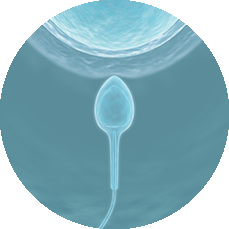
Overview/Mission
FIB’s mission is to encourage, enable, and support research aimed at alleviating human infertility, uncovering new possible pathways to control fertility, and expanding fundamental knowledge of processes that underlie human reproduction. To this end, FIB funds basic, clinical, and translational studies to enhance our understanding of typical reproduction and reproductive pathophysiology, as well as to enable the development of more effective strategies for the diagnosis, management, and prevention of conditions that compromise male and female fertility.
Highlights
Road to Prevention of Stillbirth Requests for Applications (RFAs). NIH has published two RFAs to fund research centers and a data coordinating center that will form an integrated and collaborative Stillbirth Research Consortium. This consortium will support stillbirth-relevant basic, translational, clinical, and/or data sciences research across the United States, with a particular emphasis on ways to decrease the incidence of stillbirth in vulnerable populations.
- RFA-HD-25-010: Road to Prevention of Stillbirth – Clinical Research Centers (UG1 Clinical Trial Optional)
- RFA-HD-25-011: The Road to Prevention of Stillbirth – Data Coordinating Center (UM2 Clinical Trial Not Allowed)
- The Road to Prevention of Stillbirth Frequently Asked Questions
Uterine Fibroids and Women’s Health. Learn about NICHD support of research on uterine fibroids and women's health, and review some recent advances in understanding, diagnosing, and treating them.
Assisted Reproductive Technology (ART) and Women's Health. Learn about NICHD support of research on ART and women's health, and review some recent advances in advancing ART methods, achieving optimal conditions for ART, and understanding its long-term effects.
Polycystic Ovary Syndrome (PCOS) and Women's Health. Learn about NICHD support of research on PCOS and women's health, and review some recent advances in understanding, diagnosing, and treating this condition.
Infertility and Women's Health. Learn about NICHD support of research on infertility and learn about some recent advances in understanding, diagnosing, and treating this common condition in males and females.
Endometriosis and Women's Health. Learn about NICHD support of research on endometriosis and learn about some recent advances in understanding, diagnosing, and treating this common gynecologic condition.
Get to Know NICHD! Learn more about what inspired FIB Acting Chief Dr. Daniel Johnston and Program Officer Dr. Travis Kent to pursue science and how their decisions and experiences led them to their careers with NICHD.
Workshop on Idiopathic/Non-Aneuploid Early Pregnancy Loss (EPL): The State of the Science. This workshop, held July 22-23, 2021, included discussions of knowledge gaps, barriers to advancing the science, promising approaches, and needed tools for EPL research. Access recordings from Day 1 and Day 2, or the workshop program (PDF 160 KB) for additional information.
Physiomimetics and Organoids for Reproductive Health. This workshop, held September 23-24, 2021, focused on physiomimetics, sometimes called “organs-on-a-chip,” and organoids, and applications of these technologies for reproductive health research. Access recordings from Day 1 and Day 2, or the meeting summary (PDF 469 KB) for additional information.
Advancing Bioprinting and Regenerative Medicine Solutions for Obstetric, Gynecologic, and Pediatric Applications Workshop. This workshop, held November 16-17, 2021, was a transdisciplinary discussion on the state-of-the-science of tissue-construct manufacturing using 3D printing of biological, cellular, and tissue-based products (a.k.a., bioprinting) and regenerative medicine in the context of obstetric, gynecologic, and pediatric applications. Access recordings from Day 1 and Day 2.
Some recent findings from FIB-supported researchers include the following:
- Gene variant involved in genome integrity and male infertility. Even though male infertility affects millions of couples, the cause of primary infertility in males remains largely unknown. In a genomic study of spermatogenic failure, FIB-funded scientists from the GEnetics of Male INfertility Initiative identified single nucleotide variants (SNVs) in germ-cell nuclear antigen (GCNA), a gene on the X chromosome critical for genome integrity in male meiosis. All the identified SNVs had an extremely low minor allele frequency in the general population but were found in 7 men with spermatogenic failure in the cohort of approximately 2,200 participants. Five identified SNVs occur in key functional regions, suggesting that they disrupt structure and function of the GCNA protein, ultimately arresting germ-cell division. This is the first study implicating GCNA, a key genome integrity factor, in human male infertility. (PMID: 33963445)
- New in vitro system for mammalian meiosis. Despite conservation from yeast to humans of the chromosome structures and the fundamental molecules involved in meiosis, the trigger for meiosis differs across species, and for humans, is still unknown. In yeast, nutrient deprivation triggers meiosis; in mammals, retinoic acid (RA) and its downstream targets, while necessary for meiosis, are not sufficient to trigger it. This knowledge gap prevented scientists from initiating mammalian meiosis and spermatogenesis in vitro. In this FIB-funded study, Dr. Ning Wang and colleagues showed that nutrient deprivation plus RA, but neither alone, induced meiosis in primary mouse spermatocytes cultured without somatic cells. The combination induced both the expression of meiosis-specific genes and DNA double strand breaks. Switching these induced cells to a "meiotic progression" medium allowed them to develop to the early pachytene stage, and to form chromosomal synapses. Transcriptomic analysis of the nutrient-deprived cells identified 11 transcription factor genes that were upregulated, and associated with early meiosis in vivo, independently of RA. In addition to identifying key players in meiotic initiation, this work also establishes a valuable in vitro system for studying meiosis and producing male haploid gametes. (PMID: 33741948)
 BACK TO TOP
BACK TO TOP